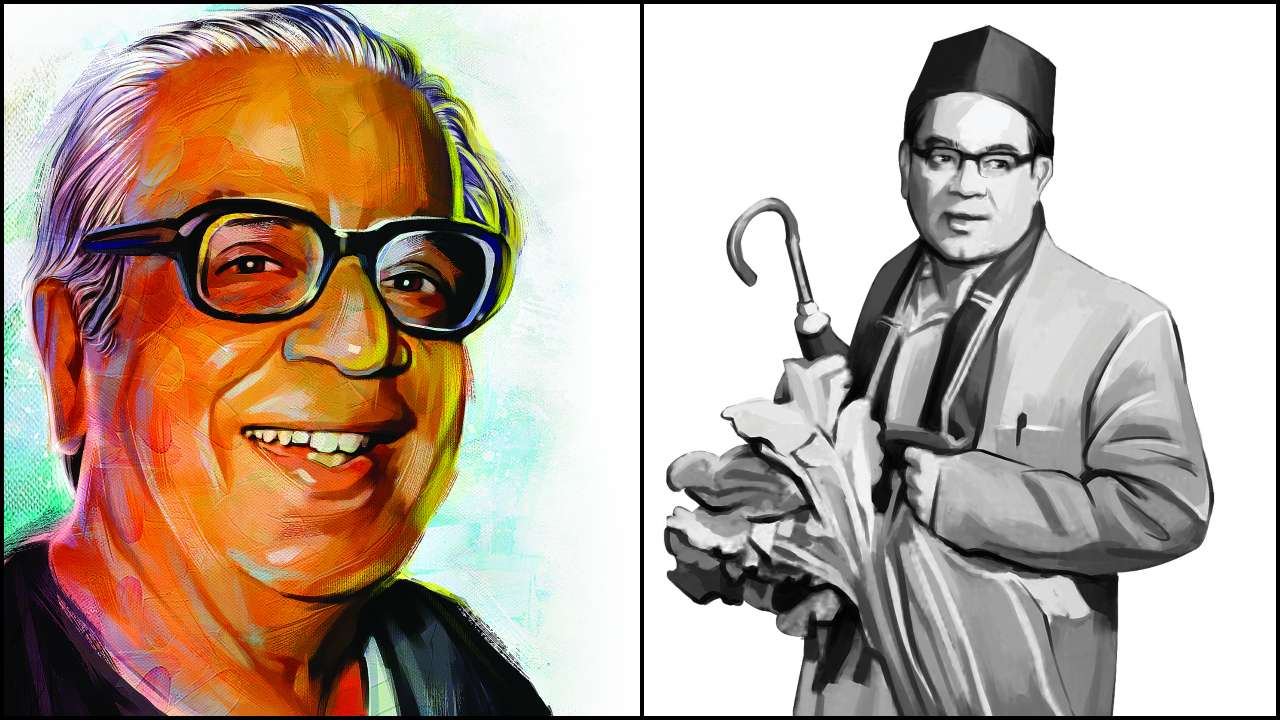
Humorist, writer, teacher, actor, composer, film and TV producer, filmmaker, music composer, singer, scriptwriter, lyricist, theatre person, one of the country's most renowned orators, an astute socio-political observer and the man who is still referred to as "Maharashtra's most beloved," nearly two decades since he passed away. P L Desphande (lovingly called Pu La) wore all his hats with an elan that can rarely find comparison.
Film-maker and actor Mahesh Manjrekar, who has begun work on a biopic, Bhai: Vyakti Ki Valli (Deshpande was called 'bhai' by those close to him) on the legend admits to the challenge: "The sheer scope and magnitude of the facets to his personality can leave one dumbfounded. Many generations later, people will wonder how this man did all these things, each so beautifully, that it can be held out as the 24-carat standard in that discipline," says the filmmaker who was himself introduced to Pu La's magic very late in life. "I went to Don Bosco at a time when the insistence on Marathi hadn't begun. I pursued French as a second language through school and an interest in Pu La arrived only later in life."
The centenary year celebration of Pu La Deshpande will start from November 8, 2018, and the movie is scheduled to release on January 4, 2019. Manjrekar brushes off suggestions that his film was planned keeping that in mind. "I discovered this by accident after I announced the film but I hope this biopic will be a worthy tribute to him."
But what will the biopic say that isn't known about the legend whose works have been translated into several Indian languages apart from English? "There are several facets of his life people still don't know," says Manjrekar. "He taught at Orient School, Mumbai where late Sena supremo Bal Thackeray was his student. Thackeray instituted the Maharashtra Bhushan awards during the Sena-BJP rule to honour his teacher. Despite being the first recipient of the award Pu La did not mince words while taking on the Sena in his acceptance speech, criticising Thackeray and sparking a controversy."
Manjrekar says the biopic will also doff its hat to incidents like these (where he charged Thackeray with transforming lokshahi into thokshahi), his first ever television interview of India's first PM Jawaharlal Nehru, his first marriage with Sunanda Divadkar (before he met and married colleague and fellow writer Sunita Thakur) and the fact that he chose to live in Shantiniketan at a very ripe age to learn Bengali from which he translated Rabindranath Tagore's Gitanjali.
While Majrekar is all excited when it comes to the biopic, actor Sagar Deshmukh, who is essaying the title role (for which he starts shooting mid-July), speaks of the enormity of what he is doing. "Pu La's so popular and revered. People will use magnifying glasses to look minutely at my portrayal. That's both unsettling and challenging to the actor within. Not that I see any character I play as less, but I still can't believe my luck that Manjrekar chose to cast me in what will clearly be a role of a lifetime."
While it is known that noted actor Iravati Harshe will portray Pu La's wife and fellow writer Sunitabai, there is much intrigue over who plays famous personalities like Jawaharlal Nehru, Balasaheb Thackeray, Baba Amte, Bhimsen Joshi, Durga Bhagwat, Vasantrao Deshpande and Kumar Gandharv in the biopic.
While the screenplay is by his son Ganesh, veteran playwright Ratnakar Matkari has written the dialogues for the biopic. "I must have been approached because I knew Pu La so well and have interacted with him at length," he says, recalling his college days when his radio-play Uhshaap won a prize. "It was 1957. Pu La was still in-charge at All India Radio and fame had begun knocking at his door with Tujhe Aahe Tujpashi. I was thrilled to be conferred the prize at his hands. We stayed in touch as I later wrote a play based on his Asa Me Asami while Pu La headed NCPA (with his team of Ashok Ranade, Arun Naik, Waman Kendre, Vridnavan Dandvate, Chetan Datar and others). I'd keep going there to read out my adaptation. Later, I also adapted his Vyakti Aani Valli. He'd moved to Pune by then and I'd travel to read out my work to him. My familiarity with the way he spoke and his choice of words made the dialogue writing for this biopic easy."
As if this weren't enough, renowned makeup designer Vikram Gaikwad will the other actors look their parts, including Deshmukh's transformation from a young collegian Pu La to an octogenarian.
All in all, one can't wait to watch this one!
1. Pu La moved from Orient school, Mumbai to Rani Parvatibai College, Belgaum to teach Marathi. He also briefly taught at Bombay College and Mahatma Gandhi Vidya Mandir, Malegaon.
2. He translated works of Ernest Hemmingway, Bertolt Brecht, Nikolai Gogol, George Bernard Shaw and Sopholes into Marathi.
3. A trained classical musician, he actually used a complex raga like Bhairavi to compose the still-famous kid's rain song Nach Re Mora. He composed music for Dev Pavla, Dudh Bhat, Ammaldar and Ghardhani.
4. His acting prowess stood out in Gulacha Ganpati, Ammaldar, Buber, Bhagyarekha and Vande Mataram.
5. He was at his humorous best in Khogirbharti, Batatyachi Chaal, Golaberij, Asa Me Asamee, which are still celebrated as the classic laugh-riots.